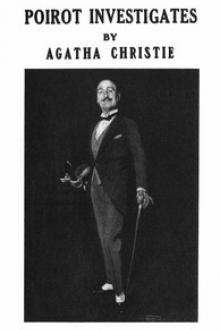Poirot Investigates - Agatha Christie (popular novels .txt) 📗

- Author: Agatha Christie
- Performer: -
Book online «Poirot Investigates - Agatha Christie (popular novels .txt) 📗». Author Agatha Christie
“That was nine years ago. I have stayed with him for a week-end occasionally, and our relations were perfectly amicable, though his views remained unaltered. He never referred to my having matriculated, nor to my B.Sc. For the last three years his health had been failing, and a month ago he died.
“I am now coming to the point of my visit. My uncle left a most extraordinary will. By its terms, Crabtree Manor and its contents are to be at my disposal for a year from his death—‘during which time my clever niece may prove her wits,’ the actual words run. At the end of that period, ‘my wits having proved better than hers,’ the house and all my uncle’s large fortune pass to various charitable institutions.”
“That is a little hard on you, mademoiselle, seeing that you were Mr. Marsh’s only blood relation.”
“I do not look on it in that way. Uncle Andrew warned me fairly, and I chose my own path. Since I would not fall in with his wishes, he was at perfect liberty to leave his money to whom he pleased.”
“Was the will drawn up by a lawyer?”
“No; it was written on a printed will-form and witnessed by the man and his wife who live in the house and do for my uncle.”
“There might be a possibility of upsetting such a will?”
“I would not even attempt to do such a thing.”
“You regard it, then, as a sporting challenge on the part of your uncle?”
“That is exactly how I look upon it.”
“It bears that interpretation, certainly,” said Poirot thoughtfully. “Somewhere in this rambling old manor-house your uncle has concealed either a sum of money in notes or possibly a second will, and has given you a year in which to exercise your ingenuity to find it.”
“Exactly, Monsieur Poirot; and I am paying you the compliment of assuming that your ingenuity will be greater than mine.”
“Eh, eh! but that is very charming of you. My grey cells are at your disposal. You have made no search yourself?”
“Only a cursory one; but I have too much respect for my uncle’s undoubted abilities to fancy that the task will be an easy one.”
“Have you the will or a copy of it with you?”
Miss Marsh handed a document across the table. Poirot ran through it, nodding to himself.
“Made three years ago. Dated March 25; and the time is given also—11 a.m.—that is very suggestive. It narrows the field of search. Assuredly it is another will we have to seek for. A will made even half-an-hour later would upset this. Eh bien, mademoiselle, it is a problem charming and ingenious that you have presented to me here. I shall have all the pleasure in the world in solving it for you. Granted that your uncle was a man of ability, his grey cells cannot have been of the quality of Hercule Poirot’s!”
(Really, Poirot’s vanity is blatant!)
“Fortunately, I have nothing of moment on hand at the minute. Hastings and I will go down to Crabtree Manor to-night. The man and wife who attended on your uncle are still there, I presume?”
“Yes, their name is Baker.”
The following morning saw us started on the hunt proper. We had arrived late the night before. Mr. and Mrs. Baker, having received a telegram from Miss Marsh, were expecting us. They were a pleasant couple, the man gnarled and pink-cheeked, like a shrivelled pippin, and his wife a woman of vast proportions and true Devonshire calm.
Tired with our journey and the eight-mile drive from the station, we had retired at once to bed after a supper of roast chicken, apple pie, and Devonshire cream. We had now disposed of an excellent breakfast, and were sitting in a small panelled room which had been the late Mr. Marsh’s study and living-room. A roll-top desk stuffed with papers, all neatly docketed, stood against the wall, and a big leather armchair showed plainly that it had been its owner’s constant resting-place. A big chintz-covered settee ran along the opposite wall, and the deep low window seats were covered with the same faded chintz of an old-fashioned pattern.
“Eh bien, mon ami,” said Poirot, lighting one of his tiny cigarettes, “we must map out our plan of campaign. Already I have made a rough survey of the house, but I am of opinion that any clue will be found in this room. We shall have to go through the documents in the desk with meticulous care. Naturally, I do not expect to find the will amongst them; but it is likely that some apparently innocent paper may conceal the clue to its hiding-place. But first we must have a little information. Ring the bell, I pray of you.”
I did so. While we were waiting for it to be answered, Poirot walked up and down, looking about him approvingly.
“A man of method this Mr. Marsh. See how neatly the packets of papers are docketed; then the key to each drawer has its ivory label—so has the key of the china cabinet on the wall; and see with what precision the china within is arranged. It rejoices the heart. Nothing here offends the eye——”
He came to an abrupt pause, as his eye was caught by the key of the desk itself, to which a dirty envelope was affixed. Poirot frowned at it and withdrew it from the lock. On it were scrawled the words: “Key of Roll Top Desk,” in a crabbed handwriting, quite unlike the neat superscriptions on the other keys.
“An alien note,” said Poirot, frowning. “I could swear that here we have no longer the personality of Mr. Marsh. But who else has been in the house? Only Miss Marsh, and she, if I mistake not, is also a young lady of method and order.”
Baker came in answer to the bell.
“Will you fetch madame your wife, and answer a few questions?”
Baker departed, and in a few moments returned with Mrs. Baker, wiping her hands on her apron and beaming all over her face.
In a few clear words Poirot set forth the object of his mission. The Bakers were immediately sympathetic.
“Us don’t want to see Miss Violet done out of what’s hers,” declared the woman. “Cruel hard ’twould be for hospitals to get it all.”
Poirot proceeded with his questions. Yes, Mr. and Mrs. Baker remembered perfectly witnessing the will. Baker had previously been sent into the neighbouring town to get two printed will-forms.
“Two?” said Poirot sharply.
“Yes, sir, for safety like, I suppose, in case he should spoil one—and sure enough, so he did do. Us had signed one——”
“What time of day was that?”
Baker scratched his head, but his wife was quicker.
“Why, to be sure, I’d just put the milk on for the cocoa at eleven. Don’t ee remember? It had all boiled over on the stove when us got back to kitchen.”
“And afterwards?”
“’Twould be about an hour later. Us had to go in again. ‘I’ve made a mistake,’ says old master, ‘had to tear the whole thing up. I’ll trouble you to sign again,’ and us did. And afterwards master give us a tidy sum of money each. ‘I’ve left you nothing in my will,’ says he, ‘but each year I live you’ll have this to be a nest-egg when I’m gone’; and sure enough, so he did.”
Poirot reflected.
“After you had signed the second time, what did Mr. Marsh do? Do you know?”
“Went out to the village to pay tradesmen’s books.”
That did not seem very promising. Poirot tried another tack. He held out the key of the desk.
“Is that your master’s writing?”
I may have imagined it, but I fancied that a moment or two elapsed before Baker replied: “Yes, sir, it is.”
“He’s lying,” I thought. “But why?”
“Has your master let the house?—have there been any strangers in it during the last three years?”
“No, sir.”
“No visitors?”
“Only Miss Violet.”
“No strangers of any kind been inside this room?”
“No, sir.”
“You forget the workmen, Jim,” his wife reminded him.
“Workmen?” Poirot wheeled round on her. “What workmen?”
The woman explained that about two years and a half ago workmen had been in the house to do certain repairs. She was quite vague as to what the repairs were. Her view seemed to be that the whole thing was a fad of her master’s and quite unnecessary. Part of the time the workmen had been in the study; but what they had done there she could not say, as her master had not let either of them into the room whilst the work was in progress. Unfortunately, they could not remember the name of the firm employed, beyond the fact that it was a Plymouth one.
“We progress, Hastings,” said Poirot, rubbing his hands as the Bakers left the room. “Clearly he made a second will and then had workmen from Plymouth in to make a suitable hiding-place. Instead of wasting time taking up the floor and tapping the walls, we will go to Plymouth.”
With a little trouble, we were able to get the information we wanted. After one or two essays, we found the firm employed by Mr. Marsh.
Their employees had all been with them many years, and it was easy to find the two men who had worked under Mr. Marsh’s orders. They remembered the job perfectly. Amongst various other minor jobs, they had taken up one of the bricks of the old-fashioned fireplace, made a cavity beneath, and so cut the brick that it was impossible to see the join. By pressing on the second brick from the end, the whole thing was raised. It had been quite a complicated piece of work, and the old gentleman had been very fussy about it. Our informant was a man called Coghan, a big, gaunt man with a grizzled moustache. He seemed an intelligent fellow.
We returned to Crabtree Manor in high spirits, and, locking the study door, proceeded to put our newly acquired knowledge into effect. It was impossible to see any sign on the bricks, but when we





Comments (0)